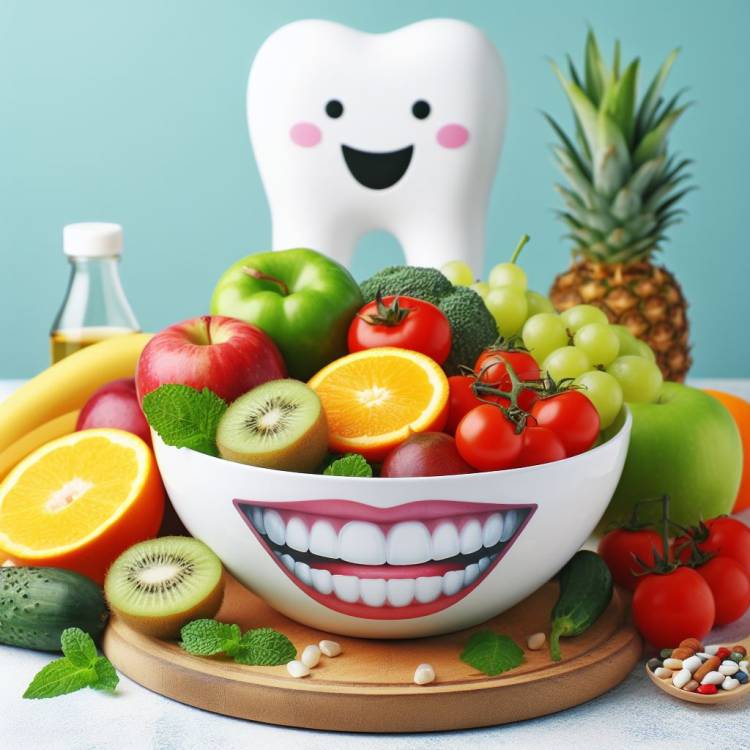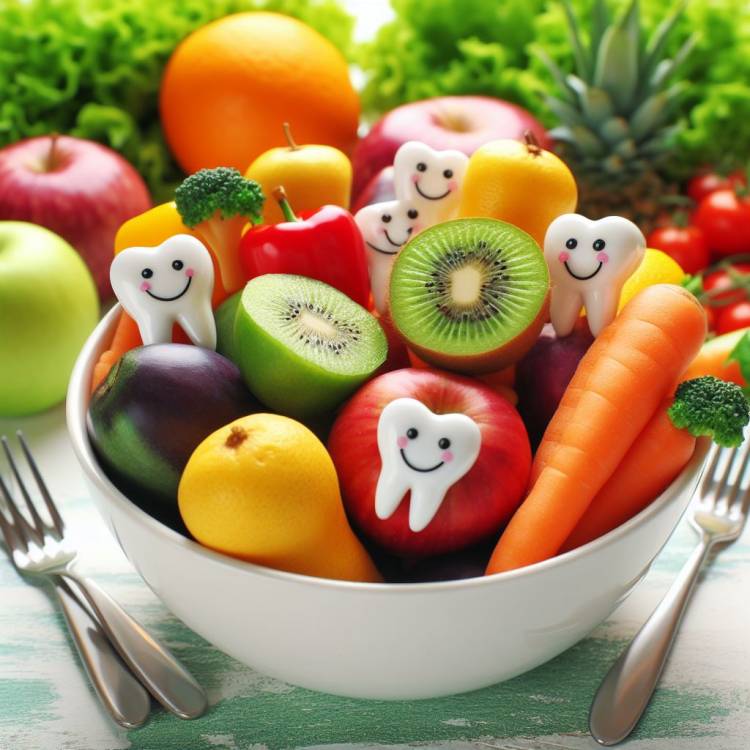In the quest for a radiant smile and optimal dental health, the importance of dietary choices cannot be overstated. This blog explores the intricate relationship between our diet and dental health, with a focus on the benefits of dairy products and the expertise of Pristine Smiles in Juhu, Mumbai. Discover how simple dietary adjustments can pave the way for stronger teeth, healthier gums, and a more confident smile.

Special Foods for Dental Health
Dairy Products:
- Benefits: Rich in calcium and phosphorus, dairy products help strengthen tooth enamel.
- How they promote dental health: These minerals are essential for rebuilding tooth enamel and maintaining overall oral health.
Leafy Greens (Spinach, Kale):
- Benefits: High in calcium and vitamins.
- How they promote dental health: Calcium helps protect teeth, while vitamins contribute to gum health.
Almonds:
- Benefits: High in calcium and protein.
- How they promote dental health: Calcium strengthens teeth, while protein supports overall oral health.
Carrots and Apples:
- Benefits: Crunchy texture stimulates saliva production.
- How they promote dental health: Saliva helps wash away food particles and neutralizes acids that can erode enamel.
Celery:
- Benefits: Acts as a natural toothbrush, scraping food particles and bacteria away from teeth.
- How it promotes dental health: Helps clean teeth and massage gums.
Green Tea:
- Benefits: Contains antioxidants that reduce inflammation and fight bacteria.
- How it promotes dental health: Helps reduce the growth of bacteria in the mouth.
Yogurt:
- Benefits: Contains probiotics that benefit oral health.
- How it promotes dental health: Probiotics help reduce the growth of harmful bacteria in the mouth.
Garlic:
- Benefits: Contains allicin, which has antibacterial properties.
- How it promotes dental health: Helps fight bacteria that can cause cavities and gum disease.
Onions:
- Benefits: Contain antibacterial properties.
- How they promote dental health: Help reduce the growth of bacteria in the mouth.
Water:
- Benefits: Helps rinse away food particles and keeps the mouth hydrated.
How it promotes dental health: Helps prevent dry mouth, which can lead to bad breath and tooth decay.
The Role of Milk
- Does milk protect or harm teeth?
- Protection: Milk can protect teeth due to its calcium and phosphorus content, which are essential for strengthening tooth enamel.
- Potential Harm: However, milk that is sweetened or flavored can contribute to tooth decay if consumed in excess, due to the added sugars.
- Benefits of Milk for Dental Health:
- Calcium: Milk is a rich source of calcium, which is crucial for maintaining strong teeth and bones.
- Phosphorus: It also contains phosphorus, another mineral that helps strengthen tooth enamel.
- Vitamin D: Fortified milk provides vitamin D, which is important for the absorption of calcium and overall oral health.
- Potential Drawbacks of Milk:
- Sugar Content: Flavored milk or milk with added sugars can contribute to tooth decay if consumed frequently or in large amounts.
- Lactose Intolerance: Some people may be lactose intolerant, which can lead to digestive issues if they consume milk.
Milk can play a beneficial role in dental health due to its calcium, phosphorus, and vitamin D content. However, it’s important to consume it in moderation and choose unsweetened varieties to avoid potential harm to teeth.
Diet and Strong Teeth/Gums
- How a Healthy Diet Supports Strong Teeth and Gums
A healthy diet provides essential nutrients that are crucial for maintaining strong teeth and gums. These nutrients include:
- Calcium: Found in dairy products, leafy greens, and fortified foods, calcium is essential for building and maintaining strong tooth enamel.
- Phosphorus: Found in meat, fish, eggs, and dairy, phosphorus works with calcium to strengthen teeth and bones.
- Vitamin D: Helps the body absorb calcium and is found in fatty fish, fortified dairy products, and sunlight.
- Vitamin C: Found in citrus fruits, strawberries, and bell peppers, vitamin C is important for healthy gums.
- Antioxidants: Found in fruits and vegetables, antioxidants help reduce inflammation and fight bacteria in the mouth.
- Explanation of the Nutrients Needed for Dental Health
- Calcium: Helps strengthen tooth enamel and bones.
- Phosphorus: Works with calcium to protect tooth enamel and support bone health.
- Vitamin D: Helps the body absorb calcium and supports overall oral health.
- Vitamin C: Supports gum health and helps prevent gum disease.
- Antioxidants: Reduce inflammation and fight bacteria in the mouth, promoting overall oral health.
A diet rich in calcium, phosphorus, vitamin D, vitamin C, and antioxidants can help support strong teeth and gums. Including these nutrients in your diet can help maintain good oral health and reduce the risk of dental problems.
How Pristine Smiles Can Help
Pristine Smiles in Juhu, Mumbai, offers a range of dental services, including:
- Preventive Dentistry: Regular check-ups, cleanings, and fluoride treatments to prevent dental issues.
- Restorative Dentistry: Treatments such as fillings, crowns, and bridges to restore damaged teeth.
- Cosmetic Dentistry: Procedures like teeth whitening, veneers, and dental implants to enhance the appearance of teeth.
- Emergency Dentistry: Immediate care for dental emergencies such as toothaches, broken teeth, or lost fillings.
- Orthodontics: Treatment options like braces or aligners to correct misaligned teeth and improve bite.
How Their Expertise Contributes to Better Dental Health
- Pristine Smiles’ team of experienced dentists and staff are dedicated to providing personalized care and treatment plans tailored to each patient’s needs.
- Their expertise in preventive dentistry helps patients maintain good oral health and prevent future dental problems.
- Their focus on patient education ensures that patients understand the importance of oral hygiene and how to care for their teeth and gums at home.
- Their use of advanced technology and techniques allows for more accurate diagnoses and effective treatments, leading to better overall dental health.

How Certain Foods Can Help Prevent Cavities and Other Dental Issues
- Foods rich in calcium and phosphorus, such as dairy products, help strengthen tooth enamel and protect against cavities.
- Crunchy fruits and vegetables, like apples and carrots, can help clean teeth and stimulate saliva production, which helps neutralize acids and wash away food particles.
- Foods high in fiber, such as whole grains and legumes, promote saliva production and can help scrub teeth clean.
- Drinking water, especially fluoridated water, helps strengthen tooth enamel and wash away food debris and bacteria.
A diet rich in nutrients that support dental health, combined with good oral hygiene practices, can help prevent cavities, gum disease, and other dental issues. Including a variety of healthy foods in your diet and limiting sugary and acidic foods can help maintain optimal dental health.
How Certain Foods Can Help Prevent Cavities and Other Dental Issues
Foods rich in calcium and phosphorus, such as dairy products, help strengthen tooth enamel and protect against cavities.
Crunchy fruits and vegetables, like apples and carrots, can help clean teeth and stimulate saliva production, which helps neutralize acids and wash away food particles.
Foods high in fiber, such as whole grains and legumes, promote saliva production and can help scrub teeth clean.
Drinking water, especially fluoridated water, helps strengthen tooth enamel and wash away food debris and bacteria.
A diet rich in nutrients that support dental health, combined with good oral hygiene practices, can help prevent cavities, gum disease, and other dental issues. Including a variety of healthy foods in your diet and limiting sugary and acidic foods can help maintain optimal dental health.
Foods to Avoid
Here are some tips to reduce the risk of tooth decay from foods:
- Eat sugary foods with meals: Consuming sugary foods with meals can help reduce the risk of tooth decay. Your mouth produces more saliva during meals, which helps neutralize acids and rinse food particles from the mouth.
- Limit between-meal snacks: Try to limit snacks between meals, especially those high in sugar or carbohydrates. If you do snack, choose healthier options and consider chewing sugarless gum afterward to increase saliva flow and wash away food particles and acid.
- Choose nutritious snacks: Opt for snacks that are low in sugar and high in fiber, such as fruits, vegetables, nuts, and cheese. These foods can help clean teeth and stimulate saliva production.
- Drink more water: Drinking fluoridated water can help prevent tooth decay. If you choose bottled water, check the label for fluoride content. Water also helps rinse the mouth and remove food particles.
- Practice good oral hygiene: Brush your teeth twice a day with fluoride toothpaste and floss once a day to remove plaque and food particles that can contribute to tooth decay.
- Visit your dentist regularly: Regular dental check-ups and cleanings can help prevent and detect tooth decay early, allowing for prompt treatment.
- Consider dental sealants: Dental sealants are thin coatings applied to the chewing surfaces of molars to protect them from decay. Talk to your dentist to see if sealants are a good option for you or your children.
- Limit sugary and acidic foods: Sugary and acidic foods and drinks can contribute to tooth decay. Limit your consumption of these foods and drink water afterward to help neutralize acids.
Eat for a healthy mouth
Sugary Foods and Beverages:
- Reason to Avoid: Sugary foods and drinks promote the growth of bacteria in the mouth, which produce acid that can erode tooth enamel and lead to cavities.
Acidic Foods and Drinks (Citrus Fruits, Soda):
- Reason to Avoid: Acidic foods and drinks can weaken tooth enamel, making teeth more susceptible to decay and sensitivity.
Sticky Foods (Caramel, Taffy):
- Reason to Avoid: Sticky foods can adhere to teeth and stay on the surface longer, increasing the risk of cavities.
Hard Candies and Ice:
- Reason to Avoid: Hard candies and ice can chip or crack teeth, and chewing on them can wear down tooth enamel over time.
Dried Fruits:
- Reason to Avoid: Dried fruits are high in sugar and stickiness, which can cling to teeth and contribute to cavities.
Sports Drinks and Energy Drinks:
- Reason to Avoid: These drinks are often high in sugar and acid, which can erode tooth enamel and lead to cavities.
Alcohol:
- Reason to Avoid: Alcohol can contribute to dry mouth, which reduces saliva flow and increases the risk of tooth decay and gum disease.
Caffeinated Beverages (Coffee, Tea):
- Reason to Avoid: Caffeinated beverages can stain teeth and, if sweetened, contribute to tooth decay.
Chips and Crackers:
- Reason to Avoid: These starchy foods can get stuck in teeth and break down into sugars, promoting bacterial growth and cavity formation.
Sour Candy:
- Reason to Avoid: Sour candies are high in acid, which can erode tooth enamel and increase the risk of cavities.
Conclusion
Maintaining good dental health is essential for overall well-being, and diet plays a significant role in this. Choosing foods that are rich in calcium, phosphorus, and vitamins while avoiding sugary and acidic foods can help protect your teeth and gums.
Key Points:
- Dairy products, leafy greens, and crunchy fruits and vegetables are beneficial for dental health.
- Foods rich in fiber, such as fruits and vegetables, help clean teeth and stimulate saliva production.
- Cheese, milk, and yogurt can help rebuild tooth enamel and protect against cavities.
- Green and black teas contain polyphenols that can help prevent bacteria growth in the mouth.
- Sugarless chewing gum and foods with fluoride can also contribute to better dental health.
Encouragement for Readers
Making dietary choices that promote dental health is a proactive step towards maintaining a healthy smile. By incorporating these foods into your diet and avoiding those that are harmful, you can protect your teeth and gums. Remember, regular dental check-ups and cleanings at Pristine Smiles in Juhu, Mumbai, can further support your efforts in achieving optimal dental health. Your smile is worth it!
FAQs
What are the special foods taken for dental health?
Special foods for dental health include those rich in calcium, such as dairy products, leafy greens, and almonds, as well as foods high in phosphorus, like meat, eggs, and fish. Vitamin C-rich foods like citrus fruits and strawberries also promote gum health.
Does milk protect or harm our teeth?
Milk can protect teeth due to its calcium content, which helps strengthen tooth enamel. However, flavored milk or milk with added sugars can contribute to tooth decay if consumed in excess.
What foods are good for your teeth and gums?
Foods like leafy greens, carrots, apples, and almonds are good for teeth and gums. They can help clean teeth, stimulate saliva production, and provide essential nutrients for oral health.
Is milk really good for your teeth?
Yes, milk is good for teeth because it contains calcium, which is essential for strengthening tooth enamel and maintaining overall oral health.
Which foods promote better dental health?
Foods high in calcium, phosphorus, and vitamin C promote better dental health. These include dairy products, lean meats, fruits, and vegetables.
How does a healthy diet support strong teeth and gums?
A healthy diet provides essential nutrients like calcium, phosphorus, and vitamins that help strengthen teeth and gums. It also helps maintain a balanced pH level in the mouth, reducing the risk of tooth decay and gum disease.
Which eating product keeps our teeth strong?
Foods rich in calcium and phosphorus, such as dairy products, leafy greens, and nuts, help keep teeth strong by providing essential minerals for tooth enamel.
Are there any benefits to drinking raw milk for dental health?
Raw milk contains beneficial bacteria and enzymes that can promote dental health. However, it also carries a higher risk of bacterial contamination compared to pasteurized milk, so caution is advised.
How does diet and nutrition affect the health of our teeth?
Diet and nutrition play a significant role in dental health. A balanced diet provides essential nutrients that strengthen teeth and gums, while poor dietary choices can lead to tooth decay and gum disease.
What foods are good for your teeth?
Foods rich in calcium, phosphorus, and vitamin C are good for your teeth. These include dairy products, leafy greens, fruits, and vegetables.
How can diet impact dental health?
Diet can impact dental health by providing essential nutrients for strong teeth and gums, balancing the pH level in the mouth, and reducing the risk of tooth decay and gum disease. Eating sugary and acidic foods can increase the risk of dental issues.

